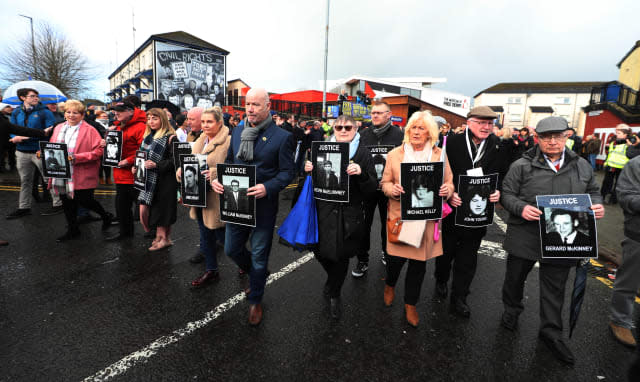Families gather for Bloody Sunday prosecution ruling

Families of those killed on Bloody Sunday have gathered in Londonderry as 17 soldiers involved on the day wait to find out if they are to be prosecuted.
Relatives were joined by supporters close to the scene of the shootings in Derry’s Bogside ahead of a march to a city centre hotel where they will find out if the veterans will face court action.
John Kelly, whose brother Michael was shot dead aged 17, said he was “hoping and praying” families will get news of prosecutions.
“We’re all very anxious, nervous, but at the same time we’re sort of fairly confident that we are going to get what we want,” he said.

Standing in the Bogside on a wet but bright morning, he added: “I’m standing here where Michael was shot dead. Hoping he’s looking down on me and saying ‘fair play to you, I’m very proud of you’. And all the families probably feel the same way that what we’re trying to achieve is for them (the victims).”
Applause broke out as the families set off at 9.15am, holding pictures of their loved ones.
As the march approached the hotel the families began singing We Shall Overcome, an anthem of the civil rights movement.
Those entering the hotel shook hands and hugged relatives before leaving them to learn the news from the prosecution service.
One of the crowd shouted: “Bring us back justice.”

Thirteen civil rights demonstrators were shot dead on January 30 1972, on one of the most notorious days of the Northern Ireland Troubles.
Former members of a support company of the 1st Battalion Parachute Regiment are facing possible charges from Northern Ireland’s Public Prosecution Service (PPS).
They could include counts of murder, attempted murder and causing grievous injury with intent.

The shootings helped galvanise support for the Provisional IRA early in the Troubles.
An image of a Catholic priest waving a bloodstained handkerchief as he tried to help a victim to safety went around the world.
Soldiers had been sent into the Bogside to deal with riots which followed a Derry march defying a ban on public processions.
As well as the 13 who died, 15 others were shot and injured. One of the injured died months later from an inoperable tumour and some consider him the 14th fatality.

A public inquiry conducted by a senior judge shortly after the deaths was branded a whitewash by victims’ families and a campaign was launched for a new public inquiry.
Relatives sought to right the wrongs of false claims that their loved ones had been armed.
A fresh probe was eventually ordered by then prime minister Tony Blair in 1998.
A decade-long investigation by Lord Saville of Newdigate concluded that the troops killed protesters who posed no threat, and seriously criticised the decision to send them into the Bogside estate in vehicles.
Following the inquiry’s conclusion in 2010, then prime minister David Cameron said the killings were “unjustified and unjustifiable”.
A murder investigation by the Police Service of Northern Ireland (PSNI) followed the £195 million inquiry and files on 18 soldiers were submitted to prosecutors in 2016 and 2017 for consideration. One has since died.
Four other soldiers included in the Saville Report died before police had completed their investigation.
A decision is also due to be taken on Thursday by the PPS on whether to charge two Official IRA suspects present on the day.
Papers before prosecutors included 668 witness statements and numerous photos, video and audio evidence.
Alan Barry, from the Justice for Northern Ireland Veterans campaign group, said he feared the paratroopers would face charges, accusing the justice system in Northern Ireland of being one-sided.


